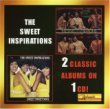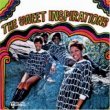Sweet Inspirations
Sweet Inspirations
Of all the many female groups that first gained popularity in the ‘60s, The Sweet Inspirations could likely claim a number of important distinctions: as session singers, the unit of Cissy Houston, Myrna Smith, Estelle Brown and Sylvia Shemwell probably sang on more hit records than any other group of background vocalists; in terms of sheer soulfulness, The Sweets were virtually peerless; and with few exceptions, the quartet was easily one of the most underrated female recording teams of their time. Even with the compact disc revolution, little of their wonderful work for Atlantic Records has been available: a "Best Of" collection was issued through the Ichiban Soul Classics series I was proud to produce in 1994 but has been out of print. The 2001 combination of two 1968 albums - "Songs Of Faith & Inspiration" and "What The World Needs Now Is Love" - the first Atlantic-derived U.S. reissue since then.
Those who have been thrilled by their amazing harmonies are familiar with the group's history prior to the release of the first Sweet Inspirations album in 1967. The group had its genesis in the recording session team that was originally created by sisters Dionne and Dee Dee Warwick. Other singers associated with that illustrious unit included at different times, Doris Troy (of "Just One Look" fame), Carol Slade and on occasion, Judy Clay. When Dionne's career began skyrocketing in 1963, she was replaced by her aunt Emily (Cissy) Houston (nee Drinkard) while Sylvia Shemwell (Judy's blood sister) became the fourth member replacing Doris or whoever else was singing on the many New York sessions of such artists as Solomon Burke, Esther Phillips, The Drifters, Lou Johnson, Garnet Mimms, Chuck Jackson and others. Then, when Dee Dee started pursuing her own solo career seriously in 1965, Myrna Smith - a cousin of the Warwicks and former member of the New Jersey-based Gospelaires - joined ‘The Group' (as the team was known among Tin Pan Alley producers and songwriters like Bacharach & David and Goffin & King). The same year, Estelle Brown - who had been successful with local New York group The Gospel Wonders (whose line-up included a young Carl Bean) - became a part of the group and The Sweet Inspirations (with Cissy Houston as chief contractor) were born.
There are conflicting stories as to how the group was named but suffice it to say that as the virtual house singers for Atlantic Records, it was label executive Jerry Wexler who suggested they become fully-fledged recording artists. An April 1967 session started the ball rolling and after a couple of charted singles, the group finally achieved what would be its biggest hit with "Sweet Inspiration" in the spring of 1968. Their debut album - released in late '67 - also became a Top 20 R&B best seller as the single started climbing the charts and it was while the group was ‘hot' that they ventured back into Atlantic's recording studios on April 3, 1968 to cut a second album.
Recalled Myrna Smith in a January 2001 phone interview, "When we were getting ready to record, we found out that Cissy and (husband-manager) John (Houston) had decided we should do a gospel album. We didn't deal much with the business part of things: we were very naïve...." As part of the same phone conversation, Estelle Bown adds: "We weren't all for doing the gospel album but we went along with it." None of the material had been pre-planned but the four singers collectively suggested songs for the two days of recording: as Myrna and Estelle note, the second day's session of four songs (the traditional spirituals "What A Friend" and "Guide Me" and two Cissy Houston compositions, "I Shall Know Him," and "Looking On The Bright Side") sadly coincided with the assassination of Dr. Martin Luther King, Jr.
Says Myrna, "We had all come out of the church and there were many people who thought we had turned our backs on gospel music when we started making secular records. We thought we would get a lot of flack when we did this album and started mixing the two..." Certainly, riding high with their first hit record, it the decision to make the gospel album at such an early juncture in The Sweet Inspirations' recording career seemed odd. Whether or not it was a wise career move, the quality of the group's vocal performances on the mixture of traditional tunes such as "Down By The Riverside," "The 23rd Psalm" and "Swing Low" and originals like Cissy's "Without A Doubt" - all cut at the April 3 session - was as strong as that on all of their recorded work.
Different members of the group took the lead on the ten songs that comprised "Songs Of Faith & Inspiration" with Cissy on six tunes, Estelle on two and Myrna and Sylvia on one each. The album was produced by Tom Dowd, who had engineered many an Atlantic session including all of Aretha Franklin's work for the label and would go on to establish himself as a key producer for the label. Myrna reflects, "If we had had more preparation time - rather than picking material on the spot - the album might have been even better." And while it was well received, Estelle notes, "We were happy with it but we didn't perform much of the material live. We did "The 23rd Psalm" but other than gospel functions, we didn't really do much else with it even though the album was well received when it was released."
"Songs Of Faith & Inspiration" was released in the summer of 1968 under the name "Cissy Drinkard & The Sweet Inspirations" and Estelle contends, "That was a catalyst towards Cissy's leaving the group a couple of years later because we saw that she was really stepping out..." And while Cissy did sing lead on many of the songs on the album, the lead vocal duties were shared more on the group's next project.
Recording for "What The Worlds Needs Now Is Love" started just under three weeks later at the same Atlantic studios in New York with production by Tom Dowd who also engineered the sessions with Arif Mardin providing string arrangements. The April 22 and 24 dates consisted of four original tunes, two of which "I Could Leave You Alone" and "Where Did It Go" were penned by Houston, and a cover version of The Bee Gees' summer '67 hit "To Love Somebody" (also recorded by Nina Simone in 1968). "It was Jerry Wexler's idea for us to do that song," says Myrna, "and The Bee Gees were actually there when we did it." Estelle recalls, "We didn't have much input in terms of the material we recorded but of course, we decided on the harmonies and one of the things we became famous for was moving harmonies up and interchanging parts so that the background vocals sounded so full, almost like a choir..."
Other songs cut on the New York April sessions were "Am I Ever Gonna See My Baby Again" (co-penned by Rudy Clark) and "Where Did It Go," issued as the "B"
side for "To Love Somebody." the first single from what would be the group's third album and a Top 40 R&B hit in July 1968. A month earlier - in June - The Sweet Inspirations headed to Memphis to complete work for the album. In all, they cut five songs: a Don Covay original, "Watch The One Who Brings You The News" which they had tried during the April New York sessions; "Unchained Melody," "Alfie", "What The World Needs Now Is Love" and one tune, "Green Grass Grew All Around" which was never issued. Neither Myrna nor Estelle remembers much about the Memphis sessions other than that they were done ‘live' with a rhythm section.
Completing the "What The Worlds Needs Now Is Love," Atlantic executives added material from earlier sessions: the Otis Redding song "That's How Strong My Love Is" was a part of the group's first date on April 25, 1967 and a cover of "I Don't Want To Go On Without You," a tune co-written by Jerry Wexler and producer Bert Berns (written under his pseudonym Bert Russell) originally recorded by The Drifters, was cut the very next day; while "Just Walk In My Shoes," a song cut by Gladys Knight & The Pips for Motown in 1966, was part of an August '67 session in Memphis.
The album "What The Worlds Needs Now Is Love" - released in November 1968 - yielded one other single, "Unchained Melody" which fared moderately well when issued in September of that same year but without much exposure or major promotion, it failed to generate major sales. The group itself was busy doing dates with Aretha Franklin who had started her golden reign at Atlantic in the spring of '67; and while the music The Sweet Inspirations made in 1968 never received the acclaim it deserved when first released, it certainly stands the test of time. As singers like Luther Vandross will quickly tell you, The Sweets were simply the best in terms of soulful harmonies and the evidence is right here.
Contributed by David Nathan
Available Music
Video
| Video of the Month - Kinsman Dazz Band - "Wake Up" |
| Song of the Month - Darnell Kendricks - "What a Wonderful Night" |
| Listen Now! - The Fresh Soul Playlist |


